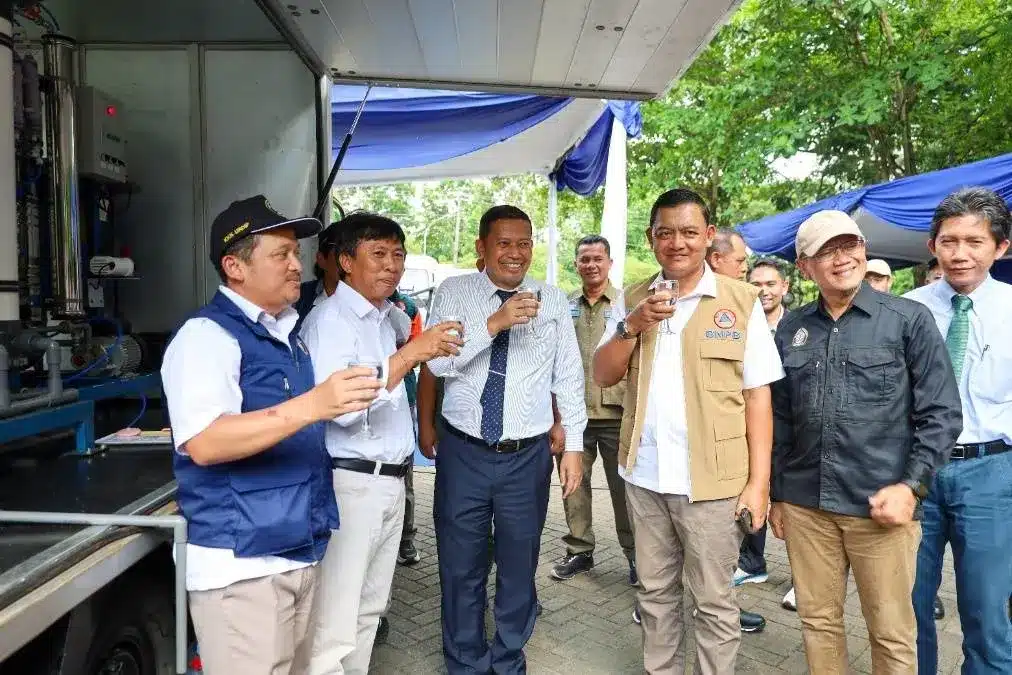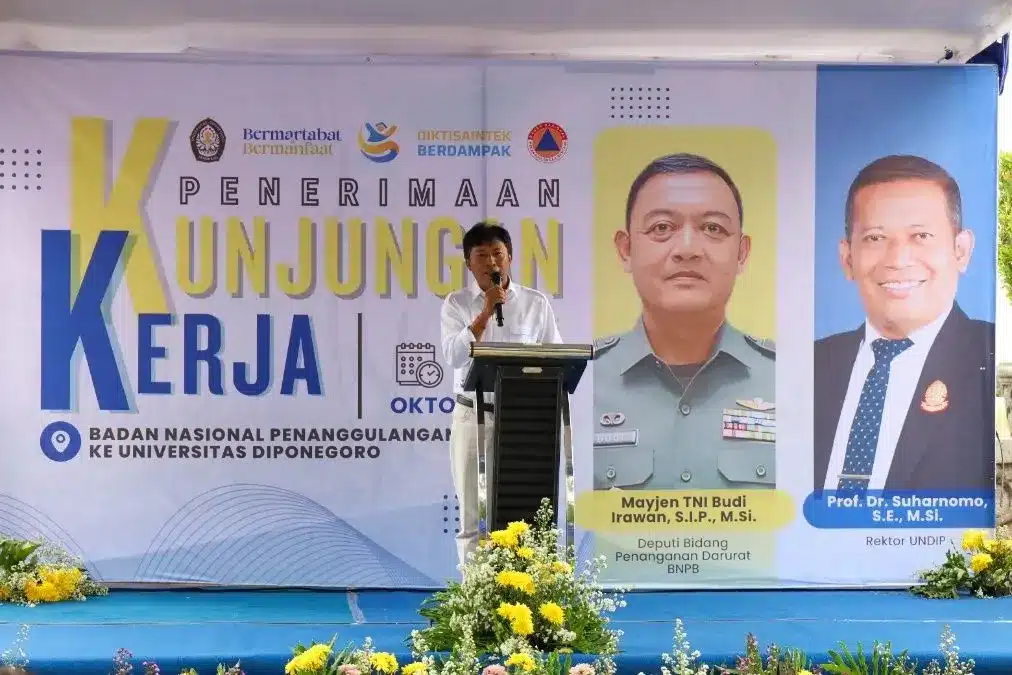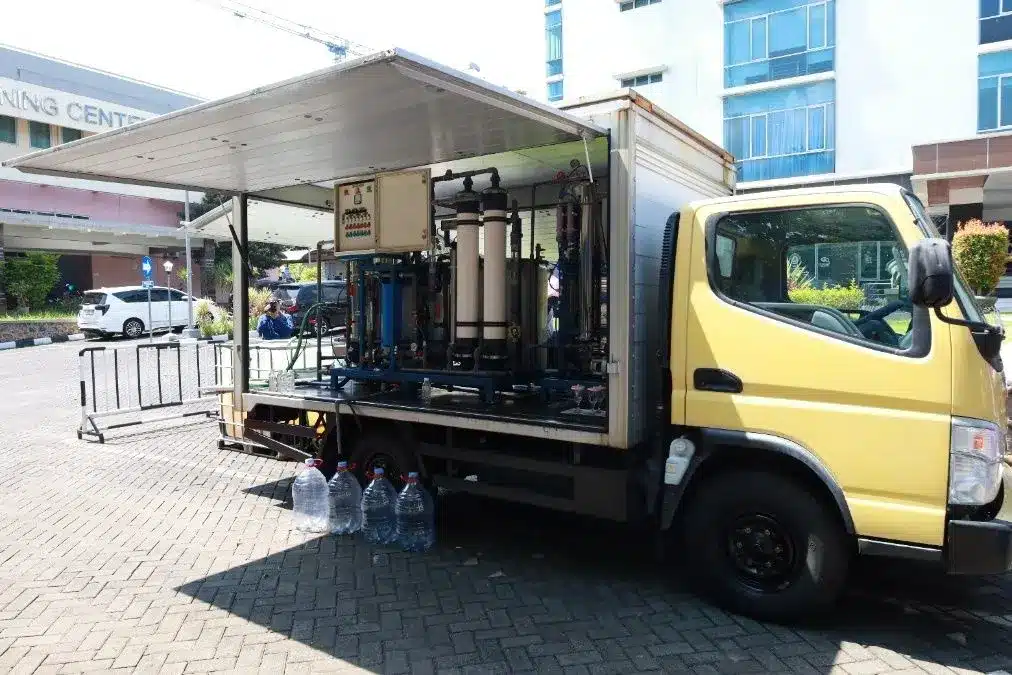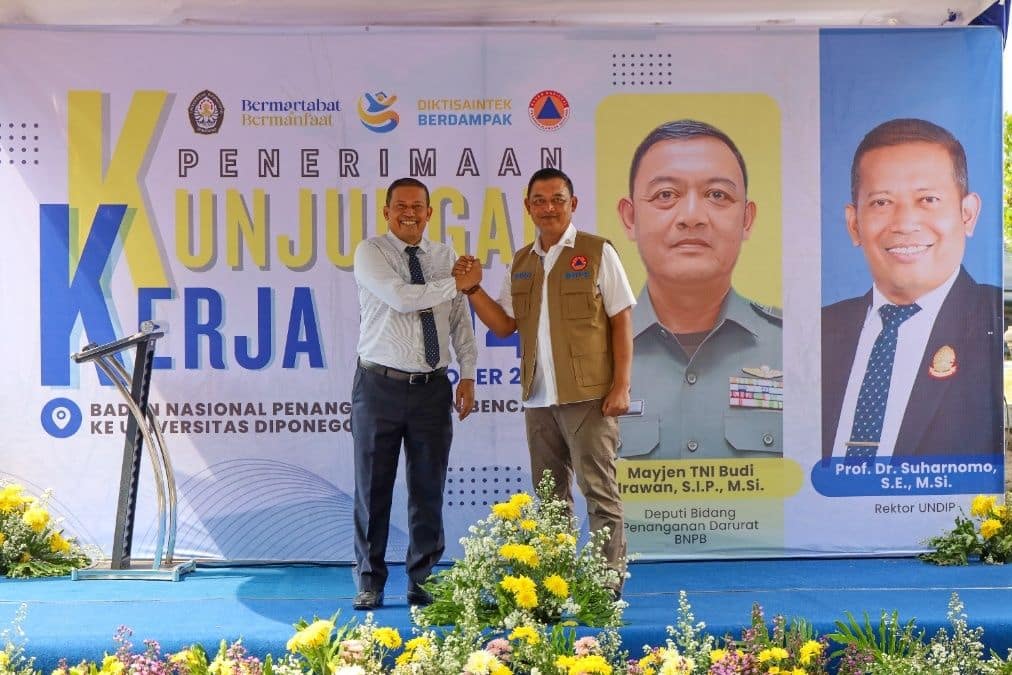UNDIP, Semarang (October 15, 2025) – Universitas Diponegoro (UNDIP) welcomed a working visit from the Deputy for Emergency Management of the National Disaster Management Agency (BNPB), Mayjen TNI Budi Irawan, S.I.P., M.Si., at the ICT Building Courtyard, UNDIP Tembalang Campus, on Tuesday, October 14, 2025. The visit marked an important milestone in strengthening research and innovation synergy in disaster management toward resilient and sustainable communities.
In his speech, UNDIP Rector, Prof. Dr. Suharnomo, S.E., M.Si., reaffirmed UNDIP’s commitment to being a university that excels not only academically but also contributes tangibly to society through socially impactful innovations.
“Over the past four years, we have implemented the Free Nutritious Meal Program to assist students in need, developed a desalination machine capable of converting brackish water into drinkable water, which has been deployed in disaster-prone areas such as Demak, Jepara, Brebes, and Rembang regencies. In addition, UNDIP has initiated the UNDIP Zero Waste Declaration to ensure 100% campus waste is independently processed into energy and fertilizer. All these efforts are part of our commitment to realizing the tagline of Noble and Valuable UNDIP,” he said.
The Rector further emphasized UNDIP’s ongoing efforts to strengthen cross-sector collaboration in supporting community resilience against disasters and climate change. Through adaptive agricultural and aquaculture innovations for coastal areas affected by tidal flooding, and the readiness of the D-DART disaster response team, UNDIP remains committed to being an active partner of BNPB in humanitarian missions.
“We do not want to stand idle when people face hardship. UNDIP is ready to take action alongside BNPB and other partners to provide research-based solutions, from saline-tolerant rice and fish for tidal flood areas to early disaster warning systems. We believe this collaboration will make a significant contribution to national resilience and humanity,” he concluded.

Meanwhile, Mayjen TNI Budi Irawan, S.I.P., M.Si., expressed appreciation for UNDIP’s achievements in disaster innovation. “I am proud to be here at Universitas Diponegoro, a campus I have long known and admired. After seeing firsthand UNDIP’s water purification technology, I am confident that this innovation will be highly beneficial and relevant in supporting disaster response across many regions,” he stated.
Deputy Budi Irawan further affirmed, “In the future, BNPB is committed to strengthening cooperation with UNDIP, including in the procurement and utilization of water purification systems to assist disaster-affected communities, particularly in Jawa Tengah. May this collaboration be the beginning of a robust, rapid, and people-centered disaster management system,” he emphasized.
Chairman of UNDIP’s Institute for Research and Community Service (LPPM), Prof. Dr.-Ing. Suherman, S.T., M.T., presented various disaster-related innovations produced by UNDIP’s academic community.
“We are committed to developing research and innovations that bring direct benefits to society. This commitment includes the development of mobile water purification units that convert floodwater into drinking water using membrane technology, mobile clinics for emergency healthcare, and the D-DART team as the frontline of UNDIP’s volunteer disaster response efforts. UNDIP continues to make science a solution for humanity,” he said.
He also underlined the importance of synergy among universities, government, and communities in building a resilient and inclusive disaster management system.
“Successful disaster management is impossible without collaboration. Therefore, we hope the partnership between UNDIP and BNPB will continue to grow — from technological development to volunteer training and field implementation — to realize an Indonesia that is disaster-resilient and humanitarianly strong,” said Prof. Suherman.
On this occasion, Ns. Nur Hafizhah Widyaningtyas, S.Kep., M.Kep., Head of the Diponegoro Disaster Assistance Response Team (D-DART), also presented UNDIP’s disaster response management framework, including educational activities through the Disaster School, water rescue training, and multidisciplinary disaster simulations. D-DART has been active in humanitarian missions, including flood response in Demak Regency, landslide relief in Brebes Regency, and post-disaster psychosocial support.

The event continued with a presentation and demonstration of the Mobile Water Treatment Unit for Disaster Response by Prof. Dr. I Nyoman Widiasa, S.T., M.T., innovator and professor at the Department of Chemical Engineering, Faculty of Engineering, UNDIP. “Today is a special moment for us, as the water treatment unit we began developing eight years ago is now truly operational for humanitarian purposes,” said Prof. Nyoman.
“This membrane-based desalination machine has evolved to include a touch-screen interface and remote control capability from Tembalang Sub-District, Semarang City. UNDIP views disasters not merely as temporary events but as systemic challenges, such as the clean water crisis in coastal areas. Therefore, we are ready to scale up production from five units to dozens, even hundreds, to assist more affected communities,” he explained.
He added, “Beyond clean water provision, UNDIP has also prepared logistical support through a 200-ton cold storage facility for emergency food reserves. We are ready to serve as a central hub for water and food systems for BNPB — anytime, anywhere.”
UNDIP’s Membrane Mobile Unit can convert floodwater, brackish water, or seawater into potable water with a capacity of up to 400 m³ per day, making it an effective rapid-response solution for disaster-affected regions. This innovation aligns with several Sustainable Development Goals (SDGs) — particularly SDG 6 (Clean Water and Sanitation), SDG 3 (Good Health and Well-Being), SDG 13 (Climate Action), and SDG 17 (Partnerships for the Goals).
Through this initiative, UNDIP reaffirms its commitment to being a noble and valuable university, using science and technology as instruments of social transformation that directly benefit humanity while strengthening Indonesia’s contribution to achieving the 2030 Agenda for Sustainable Development. (Public Communication / UNDIP / DHW)











